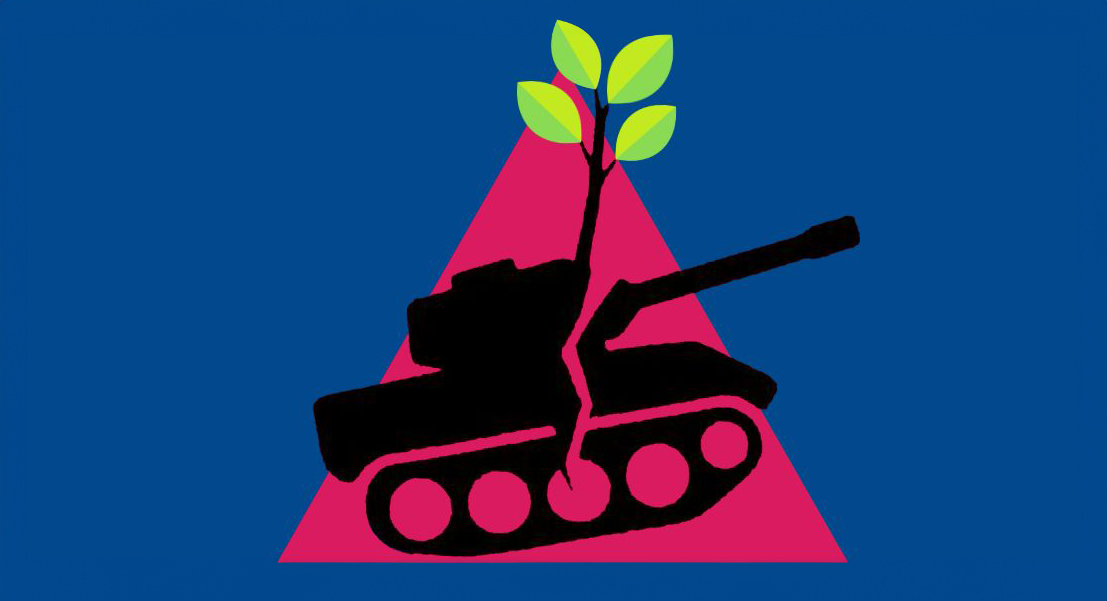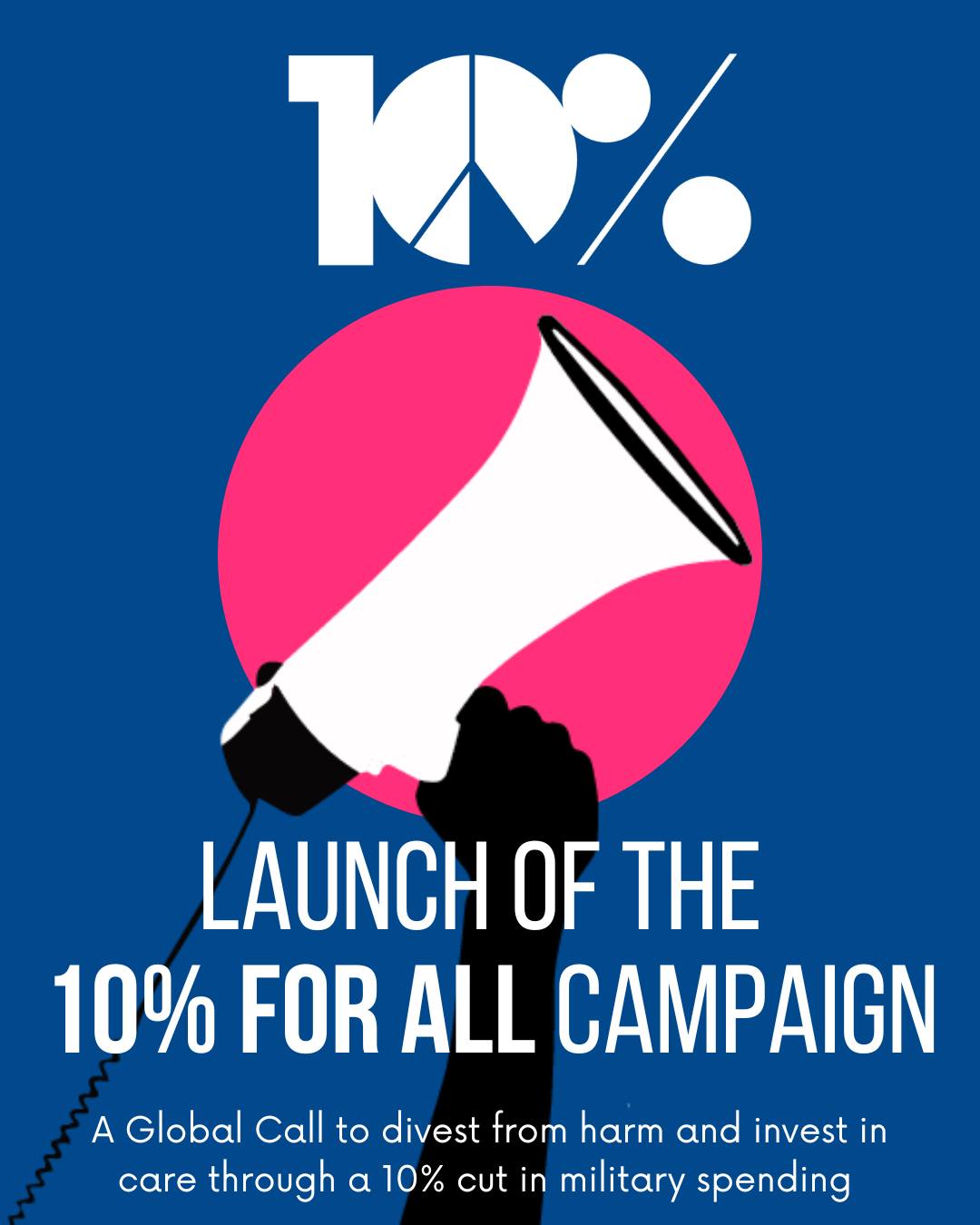

Sahar Vardi and Mike Merryman-Lotze
Sahar and Mike are members of the “10% for All” Core Group. Visit the website of the campaign here: https://10percentforall.org/
By Sahar Vardi and Mike Merryman-Lotze
Adapted from presentation at “Karibu Space” solidarity gathering of Karibu’s partner network in June 2025.
In 2024, global military spending reached a staggering $2.718 trillion and marked the highest level ever recorded, surpassing Cold War peaks. This massive expenditure comes amid escalating global crises: hunger, climate breakdown, growing refugee flows, and rising authoritarianism threaten human security and deepen inequalities worldwide.
For the past year or so, a broad coalition of civil society groups around the world has therefore been working on a new campaign under the banner of “10% for All.”
The idea is pretty simple: the campaign calls for a 10% cut in global military spending and the redirection of those funds into social, climate, and other urgent priorities—both globally and domestically.
The organizations involved aren’t just from across the globe; they also represent a wide range of social justice movements. Climate groups, workers’ rights organizations, land rights collectives—each brings a different perspective to the table. These aren’t just traditional anti-militarism or peace organizations, but groups grounded in broader visions of justice. From the start, we’ve worked to make sure the language and goals of the campaign resonate with grassroots communities worldwide.

What the Campaign Is Calling For
Broadly speaking, the campaign rests on three core components:
1. It’s not just about the money.
Yes, we’re calling for a reduction in military spending. But we’re also using that call to open a deeper conversation: What does real security look like? And how is it actually created?
2. We’re building on decades of work.
This is not the first initiative of its kind. We’re in conversation with people and organizations who’ve been pushing in this direction for years. We’re exploring multiple strategies—not just the vision of a global treaty, but also regional agreements (inspired by the nuclear weapon–free zones) and bilateral efforts. The aim is to build a campaign that is both tangible and strategic.
3. It’s about investing in our shared future.
This campaign isn’t only about what we’re against. It’s about what we’re working toward: safer, more just societies where resources are invested in the wellbeing of people and planet.
The Imbalance in Global Military Spending
The campaign is calling for at least a 10% reduction in global military spending. But again, it’s not just about reducing budgets—it’s about what we do with the money we free up.
If we imagine what is possible, a 10% reduction in military budgets worldwide would free up 270 billion USD every year. This amount could, for example, be enough to:
- End world hunger: USD 39-50 billions
- Cover half the annual gap in climate financing needed in the Global South: USD 165.5 billions
- Still leave billions of dollars available for domestic medical care, infrastructure, and other social welfare programs
Instead, we see military budgets are ballooning – particularly in the Global North. Take the recent NATO Summit: under pressure from the U.S., European countries are now committing to increase military spending to 5% of Gross National Product. In Germany, that could translate to 50% of the national budget being devoted to so-called security. In the U.S., if the current budget passes, up to 70% of the discretionary federal budget would go towards militarism.
At the same time, international aid and development funding is plummeting. USAID, for instance, has faced dramatic cuts over the past year.
This trend flies in the face of what research tells us. Studies consistently show that what builds long-term security is not militarization, but investments in health care, education, housing, and community resilience. These investments lead to more stable governance, less violence, and stronger social cohesion. On the flip side, research on U.S. military assistance programs shows that in many cases, rather than reducing conflict, military aid actually increases instability and violence.
Shifting the Conversation
That’s why this campaign is about something bigger than just numbers. We want to create space for a global conversation—one that asks what really makes people and communities safe, and how to redirect public resources to meet people’s actual needs.
Doing this means challenging dominant, militarized definitions of security. It also means ensuring that this conversation includes a diversity of voices—especially those from the Global South who experience militarism in very different ways than those in the North.
A few months ago, we held a gathering in Costa Rica with some of our early partners. One message came through loud and clear: in many countries, even talking about military spending is difficult. Governments are extremely protective of their defense budgets, and critical voices are often marginalized or silenced.
From the beginning, our goal has been to avoid the kind of Global North dominance that so often shapes international advocacy. Instead, we’re working to build a truly international network—one that centers the voices of those most impacted by militarism and lets their priorities shape the agenda.
“As more and more people begin to challenge militarism, it’s crucial that this conversation be truly global—inclusive of voices from every region, not just the dominant centers of power.”
Building a Global Coalition
Right now, around 17 or 18 organizations from across the world are already part of the coalition. At the end of May, we hosted our first civil society launch. Over the coming months, we hope to grow that base—connecting with more organizations, learning who wants to be involved and in what ways.
To do that, we’re organizing not only global launches but regional gatherings as well. These are tailored to different time zones, languages, and local contexts.
We’ve also been engaging with movement spaces that overlap with this work. Recently, we participated in the Bonn Climate Camp and the International Conference on Financing for Development in Seville. There’s natural alignment here—particularly with climate justice movements—so we’re also looking ahead to COP30, the G20, and other moments to deepen these conversations before moving into broader public advocacy.
Why This Matters Now
We know that cutting military spending won’t happen overnight – especially in the dramatically changing global political climate we find ourselves in. Even if we’re successful, it may take years of work. We’re not naïve about that.
But we believe this is a necessary step toward changing the global narrative about security—and ultimately, the structures that uphold militarism.
Across the globe, power is often built on military and economic dominance. But this model is cracking. We simply can’t afford current levels of military spending—financially, socially, or environmentally.
This work is about pushing back against that unsustainable system. We know the institutions we’re challenging are powerful. But we’re also seeing new alliances forming and new cracks in the old order. As more and more people begin to challenge militarism, it’s crucial that this conversation be truly global—inclusive of voices from every region, not just the dominant centers of power.
What can you do:
First of all, you’re welcome to join us! We are inviting civil society groups and organizations to join either as coalition partners, helping shape and promote the campaign, or as allies, signing on to the call and helping spread the word. ‘
We also would love to learn from you experience, hear your ideas, and get feedback about the strengths and shortcoming of the campaign, and how to make it stronger. We see this as a collaborative effort, and would love for your input.
